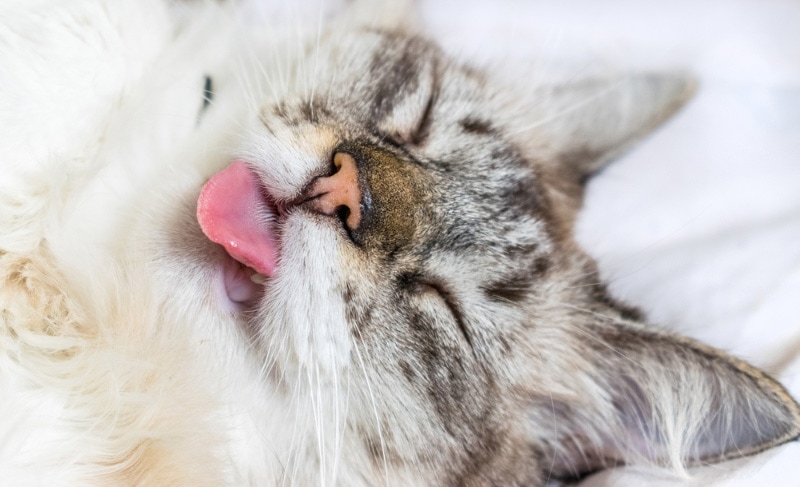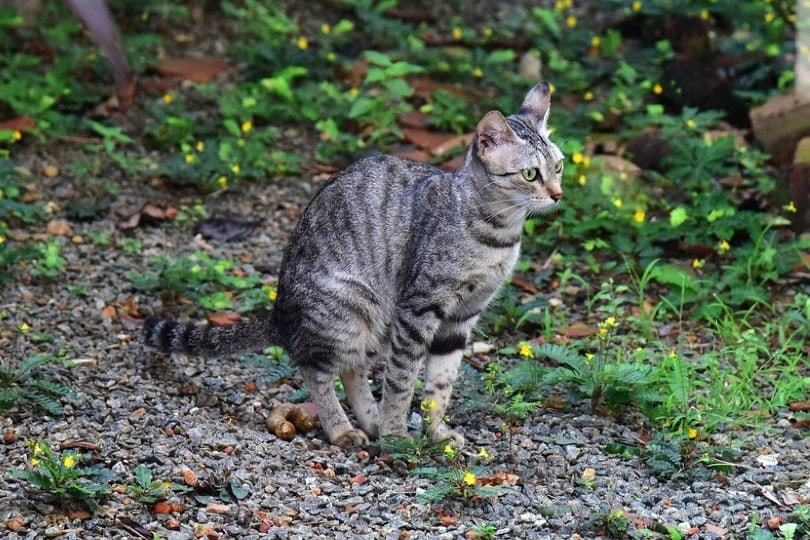Why Do Cats Have Wet Noses? Vet-Reviewed Science-Based Facts & FAQ

Updated on
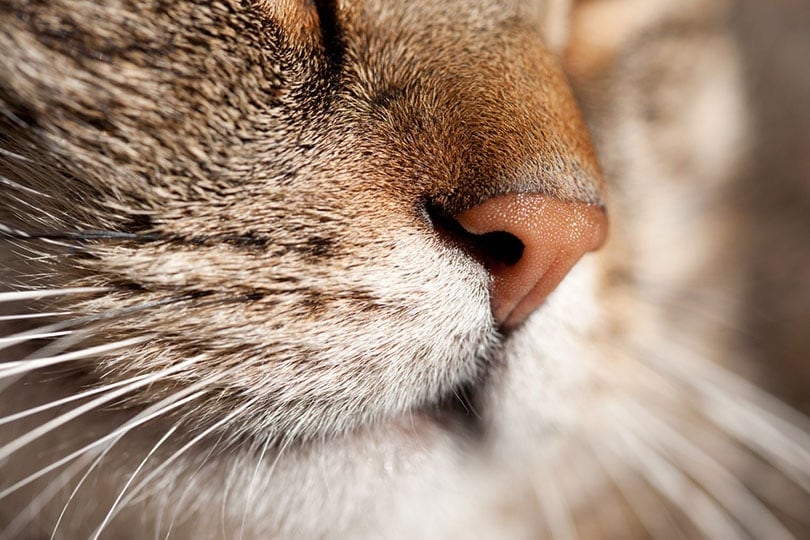
Those early morning wake-up visits from your cat wouldn’t be complete without the feeling of your kitty’s wet nose against your cheek. If you’ve ever wondered why your cat has a wet nose, there are some reasons for it.
You may be surprised to learn that many mammals have wet noses, and that includes animals in the wild and those we keep as pets. So, what’s the deal with animals like your cat having a moist nose?
Cats have wet noses as a result of a thin layer of mucus on their nasal passages that helps them enhance their sense of smell and may help to regulate their body temperature. To better understand the reason why cats have wet noses, you have to know a bit about animal biology.
Get to Know the Rhinarium
The moisture that is created by a cat’s nose primarily comes from glands located inside the nasal passage and inner lining of the nose. Some use the term “rhinarium” when speaking about the hairless subtly wrinkled skin that surrounds the nostril openings. In addition to these glands, the drainage from a cat’s tear ducts also contributes to the animal’s wet nose.
Of course, drinking water can cause a cat’s nose to be wet, as can environmental factors like rain and snow. Cats can also get wet noses from grooming themselves which is something they spend lots of time doing.
Now that you know where the moisture comes from on a cat’s nose, we’ll get into the nitty-gritty and tell you the reasons why felines have wet noses. However, cats will have a dry nose at times, and this can be absolutely normal, as it depends on many factors.
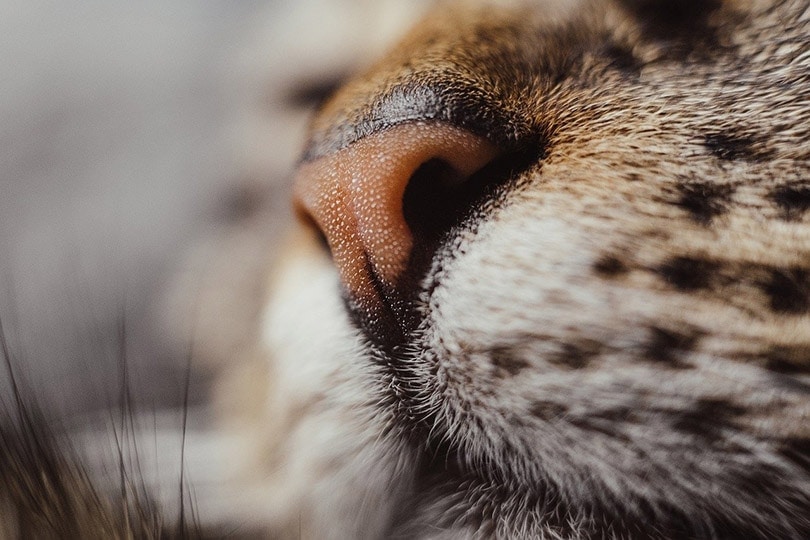
A Wet Nose May Help Keep the Body Temperature in Check
As humans, sweat pours out of our bodies on hot days to cool our bodies down. Unlike us, cats cannot sweat all over their bodies as the majority of their sweat glands, that provide cooling, are on their paws.
When cats get hot and start feeling overheated, they may also use their wet, hairless noses to assist in evaporation to help regulate their body temperature. However, the majority of the glands used to produce sweat in cats are located on their paws, lips and chin.
A Wet Nose Fine Tunes Their Smelling
Unlike us humans who have abundant taste buds covering our tongues, cats have very few of these taste receptors on their tongues to determine what foods to eat.
Instead of using taste buds to decide what to eat, cats rely on their sense of smell. The moisture on a cat’s nose traps scent particles, allowing the animal to zero in smells to determine what they are. If a cat has a problem like a respiratory infection that leaves their nose congested, blocked, warm, and dry, the animal loses some of their ability to smell which, in turn, decreases their appetite.
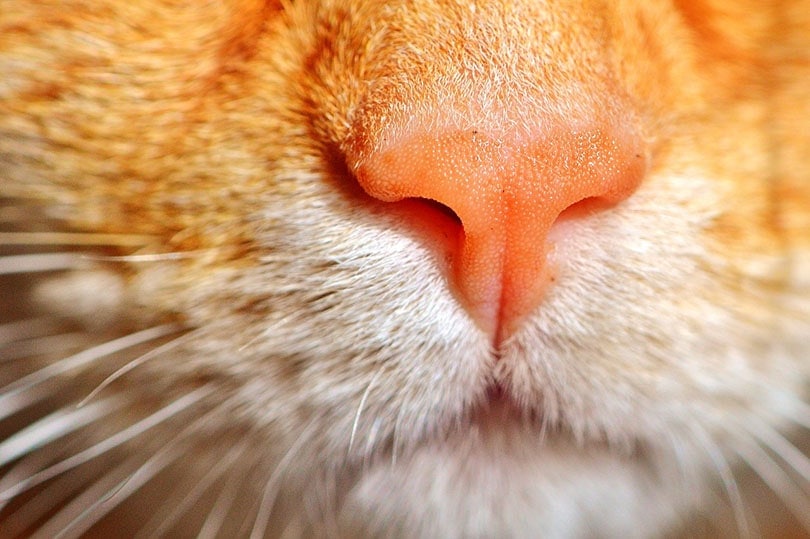
A Cat’s Nose Moisture Varies
Because cats usually have cool wet noses, some cat owners think that a warm and dry nose means a cat is sick, but that’s not necessarily true. During a typical day, a cat’s nose temperature and moistness vary. Your cat can wake you up by placing their wet, cool nose on your chin and have a warm dry nose later in the day when they’re lounging around.
Dr. Patterson of the department of Veterinary Medicine & Biomedical Sciences at Texas A&M stated that “wet or dry noses are not a sign of illness per se” and whether your pet’s nose is dry or wet is “largely related to the temperature and humidity in their environment.”
When to Worry About a Dry Nose
While you don’t have to worry if your cat’s nose is sometimes dry, you should be concerned if your cat shows any signs of illness. Things to watch for may include changes in thirst and urination, decreased appetite, weight loss, sneezing, snuffling, coughing, vomiting, or diarrhea. If your cat’s nose seems to always be dry or you notice any of these or other signs, contact your veterinarian to find out what’s wrong.
A Wet Drippy Nose May Be a Warning Sign
While it’s common for a cat to have a cool, wet nose, it’s not common for a cat to have a nose that runs or drips. If you notice your cat has a runny nose, they could be suffering from an upper respiratory inflammation, infection, presence of a polyp or a foreign body in their nose, or allergies. If the drainage coming out of the nose is thick and colored, it could be a bacterial infection related to a dental issue or something stuck in the nasal passage that shouldn’t be there. A cat suffering from an upper respiratory disease may cough, sneeze, become lethargic, sometimes retch and vomit, and have runny eyes. The cat will probably also have a fever and refuse to eat.
If the drainage coming from the nose is clear, it may be a minor inflammation or a sign of allergy and irritation. Either way, play it safe and contact your veterinarian. Remember that your pet cat depends on you to safeguard their health, so don’t hesitate to reach out for medical advice/assistance whenever you suspect your cat is ill.
Conclusion
Your feline companion relies on that cute nose of theirs to explore their environment, and it provides them with a very proficient sense of smell. It’s normal for cats to have wet noses because the moisture helps regulate body temperature and fine-tunes their sense of smell. The next time your kitty cat snuggles up to you, take a good look at that cute little nose to appreciate how important it is!
See also:
Featured Image Credit: JM Fotografie, Shutterstock



